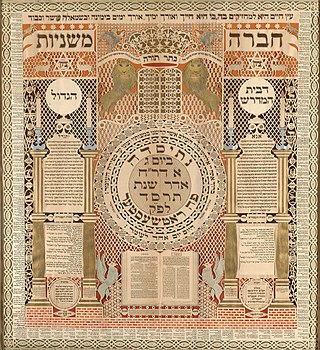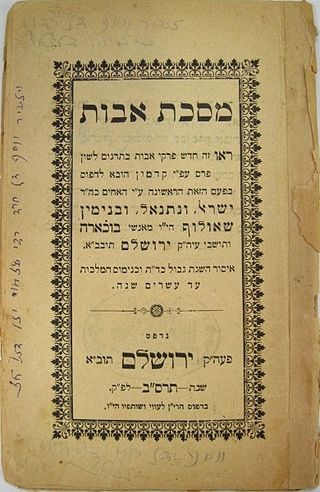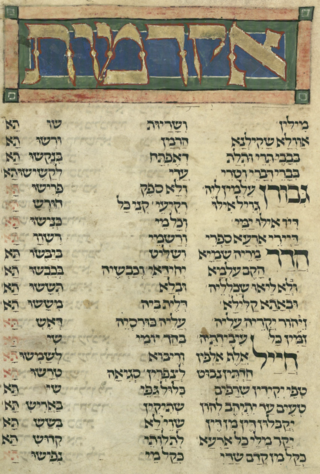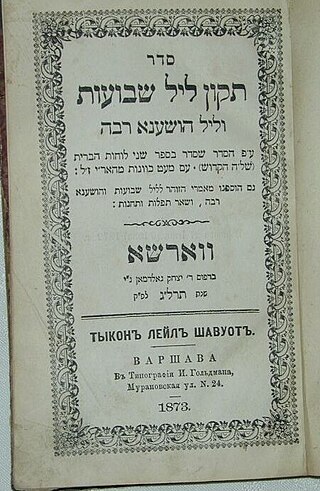Contemporary
- Tikkun (magazine), a quarterly interfaith Jewish magazine and website
- Tiqqun , a radical French philosophical journal
- Tikkun (film), a 2015 Israeli film
Tikkun/Tikun/Tiqqun (תיקון) is a Hebrew word meaning "amending/fixing". It has several connotations in Judaism:

Jewish holidays, also known as Jewish festivals or Yamim Tovim, are holidays observed by Jews throughout the Hebrew calendar. They include religious, cultural and national elements, derived from three sources: mitzvot, rabbinic mandates, the history of Judaism, and the State of Israel.
Shemini Atzeret is a Jewish holiday. It is celebrated on the 22nd day of the Hebrew month of Tishrei in the Land of Israel, and on the 22nd and 23rd outside the Land, usually coinciding with late September or early October. It directly follows the Jewish festival of Sukkot which is celebrated for seven days, and thus Shemini Atzeret is literally the eighth day. It is a separate—yet connected—holy day devoted to the spiritual aspects of the festival of Sukkot. Part of its duality as a holy day is that it is simultaneously considered to be both connected to Sukkot and also a separate festival in its own right.

Shavuot, or Shvues in some Ashkenazi usage, commonly known in English as the Feast of Weeks, is one of the biblically-ordained Three Pilgrimage Festivals. It occurs on the sixth day of the Hebrew month of Sivan; in the 21st century, it may fall between May 15 and June 14 on the Gregorian calendar.

Counting of the Omer is a ritual in Judaism. It consists of a verbal counting of each of the 49 days between the holidays of Passover and Shavuot. The period of 49 days is known as the "omer period" or simply as "the omer" or "sefirah".

The Five Scrolls or the Five Megillot are parts of the Ketuvim ("Writings"), the third major section of the Tanakh. The Five Scrolls are the Song of Songs, the Book of Ruth, the Book of Lamentations, Ecclesiastes and the Book of Esther. These five relatively short biblical books are grouped together in Jewish tradition.
Tikkun olam is a concept in Judaism, which refers to various forms of action intended to repair and improve the world.

Pirkei Avot, which translates to English as Chapters of the Fathers, is a compilation of the ethical teachings and maxims from Rabbinic Jewish tradition. It is part of didactic Jewish ethical literature. Because of its contents, the name is sometimes given as Ethics of the Fathers. Pirkei Avot consists of the Mishnaic tractate of Avot, the second-to-last tractate in the order of Nezikin in the Mishnah, plus one additional chapter. Avot is unique in that it is the only tractate of the Mishnah dealing solely with ethical and moral principles; there is relatively little halakha (laws) in Pirkei Avot.

A tikkun or tiqqun is a book used by Jews to prepare for reading or writing a Torah scroll. There are two types of tikkun, a tikkun kor'im and a tikkun soferim.
The Three Pilgrimage Festivals or Shalosh Regalim, are three major festivals in Judaism—two in spring; Passover, 49 days later Shavuot ; and in autumn Sukkot —when all Israelites who were able were expected to make a pilgrimage to the Temple in Jerusalem as commanded by the Torah. In Jerusalem, they would participate in festivities and ritual worship in conjunction with the services of the kohanim (priests) at the Temple.

Chumash is a Torah in printed and book bound form as opposed to a Sefer Torah, which is a scroll.

Akdamut, or Akdamus or Akdamut Milin, or Akdomus Milin, is a prominent piyyut written in Aramaic recited annually on the Jewish holiday of Shavuot by Ashkenazi Jews. It was penned by Rabbi Meir bar Yitzchak of Orléans, who was a cantor in Worms, Germany,. Akdamut consists of praise for God, His Torah, and His people.
Jonathan (Yonason) Rosenblum is the director, spokesperson, and founder of Jewish Media Resources, an organization which attempts to clarify journalists' understanding of Haredi Jewish society.
Lurianic Kabbalah is a school of Kabbalah named after Isaac Luria (1534–1572), the Jewish rabbi who developed it. Lurianic Kabbalah gave a seminal new account of Kabbalistic thought that its followers synthesised with, and read into, the earlier Kabbalah of the Zohar that had disseminated in Medieval circles.
Tikkun Chatzot, also spelled Tikkun Chatzos, is a Jewish ritual prayer recited each night after midnight as an expression of mourning and lamentation over the destruction of the Temple in Jerusalem. It is not universally observed, although it is popular among Sephardi and Hasidic Jews.

Chabad mitzvah campaigns, or Mivtzo'im refer to several campaigns launched by the Lubavitcher Rebbe, Menachem Mendel Schneerson. From 1967 to 1976, Schneerson said all Jews should observe ten basic "beginner's mitzvot" (commandments) . In the years that followed there were campaigns for additional mitzvot as well.
Tikkun HaKlali, also known as The General Remedy, is a set of ten Psalms whose recital serves as teshuvah (repentance) for all sins — in particular the sin of "wasted seed" through involuntary nocturnal emission or masturbation. The Tikkun HaKlali is a unique innovation of Rebbe Nachman of Breslov, and its recital is a regular practice of Breslover Hasidim to this day.

Tiqqūn sōferīm is a term from rabbinic literature meaning "correction/emendation of the scribes" or "scribal correction" and refers to a change of wording in the Tanakh in order to preserve the honor of God or for a similar reason. Today, the phrase Tiqqun Soferim can also refer to a copy of the Five Books of Moses that is used to copy therefrom the Torah scroll.

Tikkun Leil Shavuot is a study order intended for the eve of the Shavuot holiday, which includes beginnings and endings of Torah portions, and it is also called the traditional Torah study on the eve of the Shavuot holiday that lasts all night.

Tikkun Leil Shabbat is an independent minyan or chavurah in Washington, DC, organized entirely by volunteer leadership and sponsored by Jews United For Justice, DC's local Jewish social justice organization. The name of the community is a reference both to Tikkun Leil Shavuot and tikkun olam. Its primary activity is Friday night, but it also meets on Jewish holidays and at other times. Tikkun Leil Shabbat attracts upward of 200 participants on Friday nights.
Moroccan cantillation (also referred to as Moroccan Te'amim, refers primarily to the style and tune used by Jews of Moroccan descent when reading the Torah. It may also refer to the tune used when reading the other books of the Tanach, and to a lesser degree, the Mishna. The Moroccan rite is distinct from other Sephardic, Yemenite and Ashkenazic cantillations and is considered to be a category unto itself.